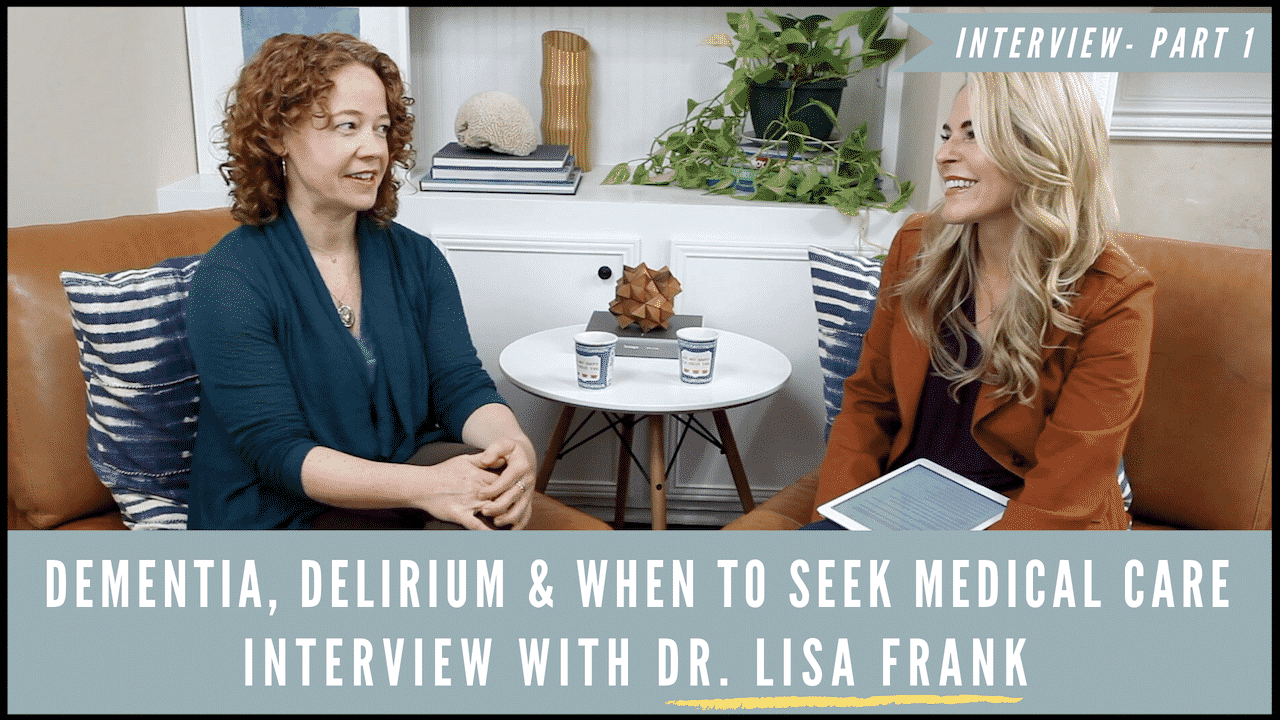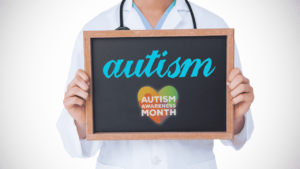One of the most complicated situations families that I work with are faced with has to do with older adults with dementia developing a delirium.
Is the dementia worsening? Or is it a delirium? It’s so hard to tell.
In this interview, Dr. Frank explains the difference between dementia and delirium and talks about the signs that you should be aware of that would indicate that your loved one needs medical care. She also gives an overview of what to expect in the Emergency Room with your loved one with dementia, who may also have delirium. And, we talk about the important role that families play.
Watch the interview now!
Lisa Frank, MD is a board certified psychiatrist with special interests in geriatric psychiatry, trauma, and mood disorders. Dr. Frank has practiced in a variety of clinical settings, including inpatient psychiatry units, partial hospitalization programs, and outpatient. She has served as
Medical Director for two acute psychiatric inpatient units and is a former faculty member of both Morehouse School of Medicine and Emory University School of Medicine, both in Atlanta, GA. Dr. Frank currently works in a community mental health care setting.
Here’s a sneak peek at what you’ll learn from my interview with Dr. Lisa Frank:
- [02:03] Dr. Frank reviews the signs that families should pay attention to that might suggest a delirium.
- [03:28] Dr. Frank defines delirium
- [05:57] Common causes of delirium are discussed by Dr. Frank, including urinary tract infections (UTIs), dehydration, even a cold.
- [06:47] Dr. Frank answers the question: “What is the difference between dementia and delirium?”
- [08:46] “It’s CRITICAL that if there is a sudden change in baseline that the loved one go to the emergency room to be evaluated for the cause”
- [09:14] Curious about the medical workup for delirium? Dr. Frank breaks it down.
- [10:26] Dr. Frank talks about how the Emergency Works and why it can sometimes take a long time for your loved one to be seen.
- [13:18] Family is essential to people with dementia receiving good care in the Emergency Room. Dr. Frank explains why.
FAQs about Delirium
In addition to what is shared in the video, I wanted to share answers to some of the most frequently asked questions I get about delirium
What is delirium?
Delirium is an acute medical problem often resulting in changes in cognitive function and mentation (e.g., the way the brain thinks, remembers, processes information, etc). It can create problems in thinking and cause confusion.
For example: An older adult who typically knows where they live and the day of the week may suddenly NOT know! Or, a person with dementia who is usually agreeable to receiving assistance from caregivers like with taking medications or bathing, may suddenly refuse care, and may even become agitated.
Delirium usually comes on very quickly. Like within hours or a few days.
What’s the difference between dementia and delirium?
Because symptoms of delirium and dementia can be similar, so much so that even doctors don’t even get it right, it’s essential that you help your aging parents communicate with their doctors by sharing what your loved one is like at baseline (what they typically look like with dementia) and how the current symptoms you are noticing are different. This will give the doctor clues about the need to evaluate for delirium. Your participation is essential in helping doctors to make an accurate diagnosis.
What are the common signs and symptoms of delirium in older adults?
Reduced awareness of the environment
This may result in:
- An inability to stay focused on a topic or to switch topics
- Getting stuck on an idea rather than responding to questions or conversation
- Being easily distracted by unimportant things
- Being withdrawn, with little or no activity or little response to the environment
Poor thinking skills (cognitive impairment)
This may appear as:
- Poor memory, particularly of recent events
- Disorientation — for example, not knowing where you are or who you are
- Difficulty speaking or recalling words
- Rambling or nonsense speech
- Trouble understanding speech
- Difficulty reading or writing
Behavior changes
These may include:
- Seeing things that don’t exist (hallucinations)
- Restlessness, agitation or combative behavior
- Calling out, moaning or making other sounds
- Being quiet and withdrawn — especially in older adults
- Slowed movement or lethargy
- Disturbed sleep habits
- Reversal of night-day sleep-wake cycle
Emotional disturbances
These may appear as:
- Anxiety, fear or paranoia
- Depression
- Irritability or anger
- A sense of feeling elated (euphoria)
- Apathy
- Rapid and unpredictable mood shifts
- Personality changes
What are the common causes of delirium in older adults?
- Certain medications or drug toxicity
- Alcohol or drug intoxication or withdrawal
- A medical condition, such as a stroke, heart attack, worsening lung or liver disease, or an injury from a fall
- Metabolic imbalances, such as low sodium or low calcium
- Severe, chronic or terminal illness
- Fever and acute infection, particularly in children
- Urinary tract infection, pneumonia or the flu, especially in older adults
- Exposure to a toxin, such as carbon monoxide, cyanide or other poisons
- Malnutrition or dehydration
- Sleep deprivation or severe emotional distress
- Pain
- Surgery or other medical procedures that include anesthesia
Why are older adults more likely to get delirium?
Delirium is also more common under the following situations that disproportionately affect older adults:
- When a person is in the hospital, especially while they are in the Intensive Care Unit (ICU)
- When a person is recovering from surgery where general anesthesia is used
- When a person is living in a nursing home or skilled nursing facility
- Brain disorders such as dementia, stroke or Parkinson’s disease
- When a person has had delirium episodes in the past, they are more vulnerable to them again
- When a person has visual or hearing impairment
- When a person has multiple medical problems
Why are people with dementia more likely to get delirium?
How can I prevent delirium in my aging parents?
- Promote good sleep habits
- Help your loved one remain calm and well-oriented
- Help prevent medical problems or other complications by following medical recommendations for managing chronic conditions, like diabetes, heart disease, COPD, etc.
- Help your loved one stay hydrated and nourished.
- Help you loved experience a good quality of life, like having sunlight and fresh air, activities. Even a schedule can help.
Why is it so important that I get my loved one to a doctor if they have delirium?
- The longer the person lives with an untreated delirium, the sicker they will get. Delirium also increases risk of death.
- The longer a person lives with untreated delirium, their health may experience lasting negative changes, even after the delirium gets treated.
- The longer an older adult lives with an untreated delirium, the greater their risk of developing dementia.
- The longer an older adult lives with an untreated delirium, the more likely they are to move to a skilled nursing facility or nursing home.
- The longer an older adult lives with an untreated delirium, the more medical treatment they will need and the more costly the care becomes.
- The longer an older adult lives with an untreated delirium, the greater the caregiver burden!
Want to learn more about dementia?
Here’s an important freebie I made just for you, It’s called, Dementia 101: A Beginner’s Guide to Dementia Disorders. In it, I describe what dementia is and isn’t. I describe the phases of dementia and what to do if you’re worried that your aging parent may have dementia. So, take a moment to download it. It answers some of the most frequently asked questions I get about dementia!
Here are some episodes that can broaden your understanding of dementia and caring for someone with dementia as well!
- Dementia is NOT a Normal Part of Aging (Ep #024)
- Interview with MJ Grant (Part 1)- MJ Talks About Caring for Her Mom with Dementia (Ep #026)
Want to learn more about delirium and dementia? The Alzheimer’s Association has a fact sheet here: https://www.alzheimers.org.uk/get-support/daily-living/delirium
That’s all for today! If you have friends who would benefit from this information, please share this video and article with them, because nobody should have to do this caregiving thing-alone.
Lots of love to you and your family.
Bye for now,
Dr. Regina Koepp
References used in this article:
*Mayo clinic: https://www.mayoclinic.org/diseases-conditions/delirium/symptoms-causes/syc-20371386
https://www.bcmj.org/articles/delirium-older-adults-diagnosis-prevention-and-treatment






